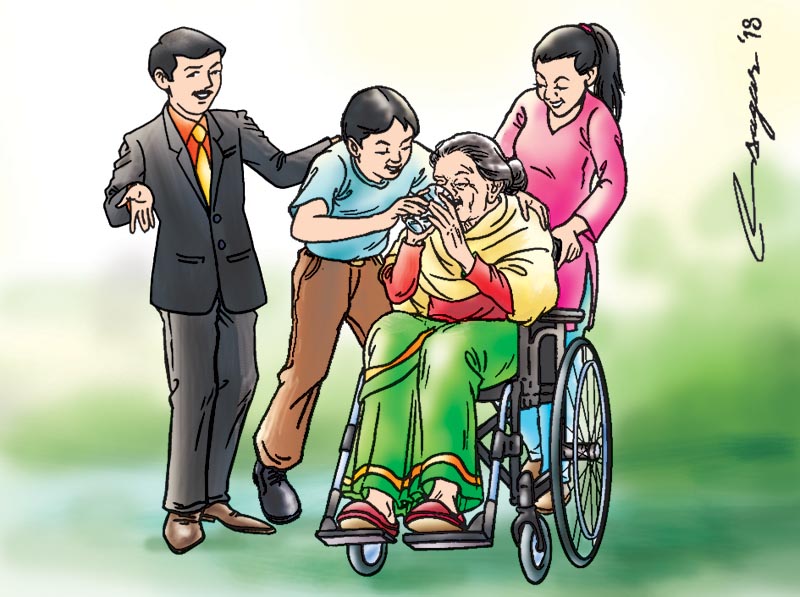Inclusive health services: Caring for women with disabilities
The right to health is a right of progressive realisation, and the state must take steps to ensure non-discrimination when it comes to right to health of women with disabilities
According to the World Health Organisation (WHO) and the World Bank, approximately 15 per cent of people worldwide are persons with disabilities, and women and girls with disabilities account for 19.2 per cent of the total population of women around the world. Women with disabilities in particular face discrimination in their daily lives based on both their gender and forms of disability.
In particular, when it comes to health-related issues, including sexual and reproductive health information and goods and services, women with disabilities face various hurdles. Health care workers are often found to have certain sets of prejudice against women and girls with disabilities.
Generally, sexual and reproductive rights are some of the most controversial, underdeveloped and least understood spheres of rights, especially in developing countries like Nepal.
Negative social attitudes among people about women with disabilities often make it difficult for them to enjoy their sexual and reproductive rights. They experience multiple barriers in the exercise of their rights due to intersection of age, gender, forms of disability, and in some cases, other factors of vulnerability such as social and economic marginalisation.
This notwithstanding, most national laws and policies to date have failed to address injustices suffered by women with disabilities. Laws and policies that address gender-based issues fail to address biases suffered by women and girls with disabilities. On top of that, such discourses often tend to fail their gender into account.
In developing nations like Nepal, the physical environment surrounding and within healthcare facilities is often inaccessible to wheelchair users, and health care workers frequently lack knowledge about or experience when it comes caring for women with disabilities. Additionally, according to Women Enabled International (WEI), women with disabilities even in developed nations such as the United States have higher rates of unemployment and poverty than the general population, and they are far less likely to have private insurance to cover reproductive health goods and services. This forces these people to rely on government health insurance if they qualify, or must purchase insurance in the open market.
Article 12 of the International Covenant on Economic, social and Cultural Rights (ICESCR) recognises the right of everyone to the enjoyment of the highest attainable standard of mental and physical health. Human rights recognised in human rights instruments adopted by the United Nations such as the Convention on Elimination of all Forms of Discrimination against Women (CEDAW), the Convention on the Right to Child (CRC), the Convention on Elimination of Racial Discrimination (CERD), and the Convention on the Rights of Persons with Disabilities (CRPD), and Sustainable Development Goals (SDGs) are at forefront in advancing sexual and reproductive rights of individuals.
The CRPD reflects the “nothing about us without us” principle of full inclusion and participation of persons with disabilities. The CRPD states that “disability is an evolving concept and that disability results from the interaction between persons with impairments and attitudinal and environmental barriers that hinder their full and effective participation in society on an equal basis with others.”
Thus, the CRPD adopts a broad categorisation of people with disabilities, moving away from the traditional medical and welfare orientation and embracing a social model of disability within which civil, political, economic, social and cultural rights are enumerated and elaborated. Article 25 of the CRPD provides that persons with disabilities have the right to the enjoyment of the highest attainable standard of health without discrimination on the basis of disability, and that state parties shall take all appropriate measures to ensure access for persons with disabilities to health services that are gender-sensitive.
Article 12 states that people with disabilities, long denied the right to make even basic decisions about their lives, have the same rights to make decisions on their personal lives, health care and reproductive rights as any other citizen. Article 12 has interpreted the provisions to include implementation of supported-decision making as opposed to substituted-decision making which is relevant in relation to involuntary sterilisation and control of the reproductive health of women with disabilities.
SDGs target 5.6 calls on states to “ensure universal access to sexual and reproductive health and reproductive rights as agreed in accordance with the Program of Action of the International Conference on Population and Development (ICPD), and the Beijing Platform for Action and the outcome documents of their review conferences.”
In conclusion, the right to health is a right of progressive realisation, and the state must take immediate steps to ensure non-discrimination when it comes to right to health of women with disabilities. States also must provide a minimum basic package of health information, goods and services, including essential medicines such as contraception, to women and girls with disabilities.
In order to ensure accessibility and acceptability of sexual and reproductive health information, goods and services in implementing SDGs, Nepal should create national level indicators so that the health-related targets for women and girls with disabilities can be achieved.
Joshi is a disability rights lawyer






